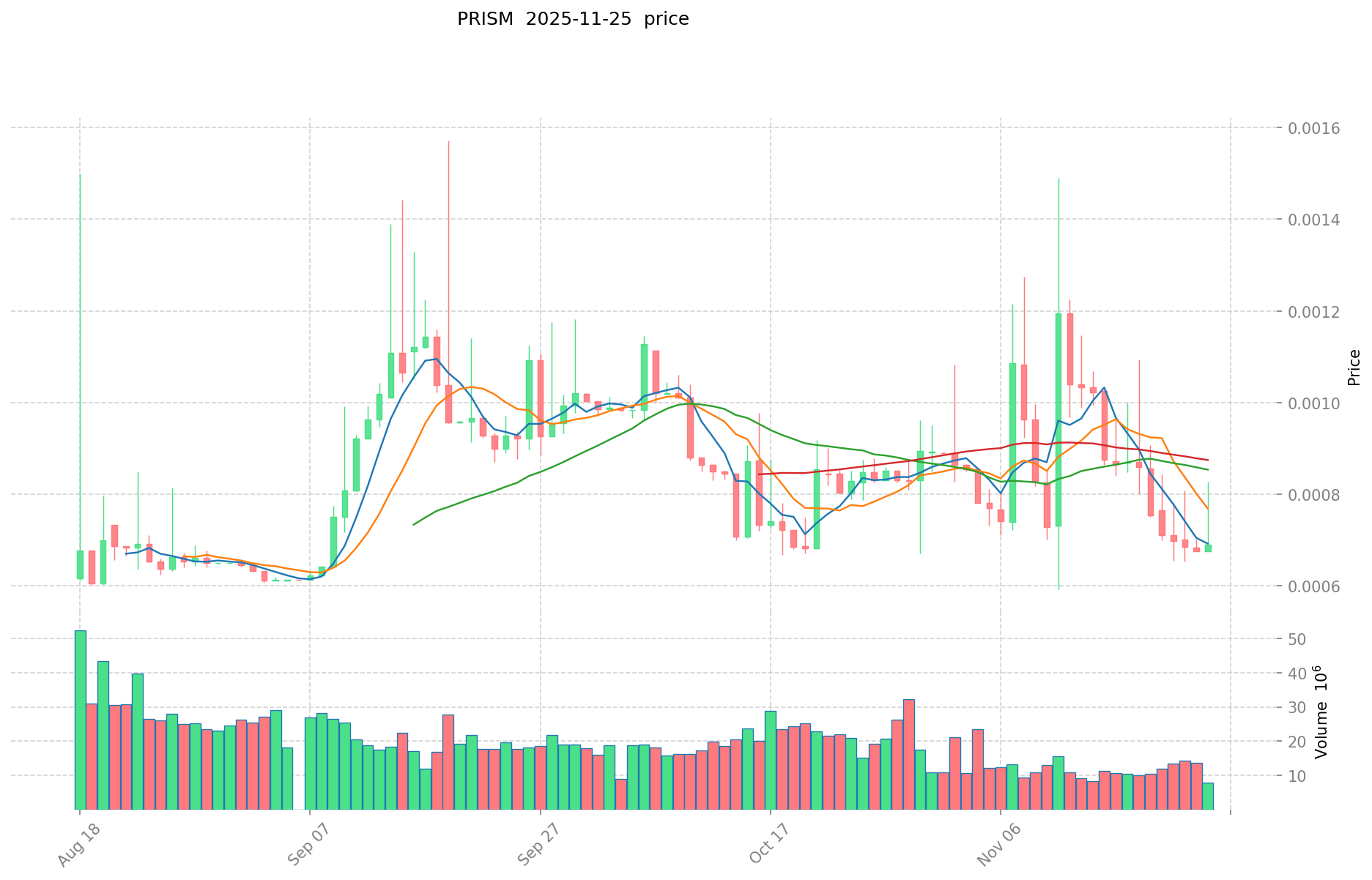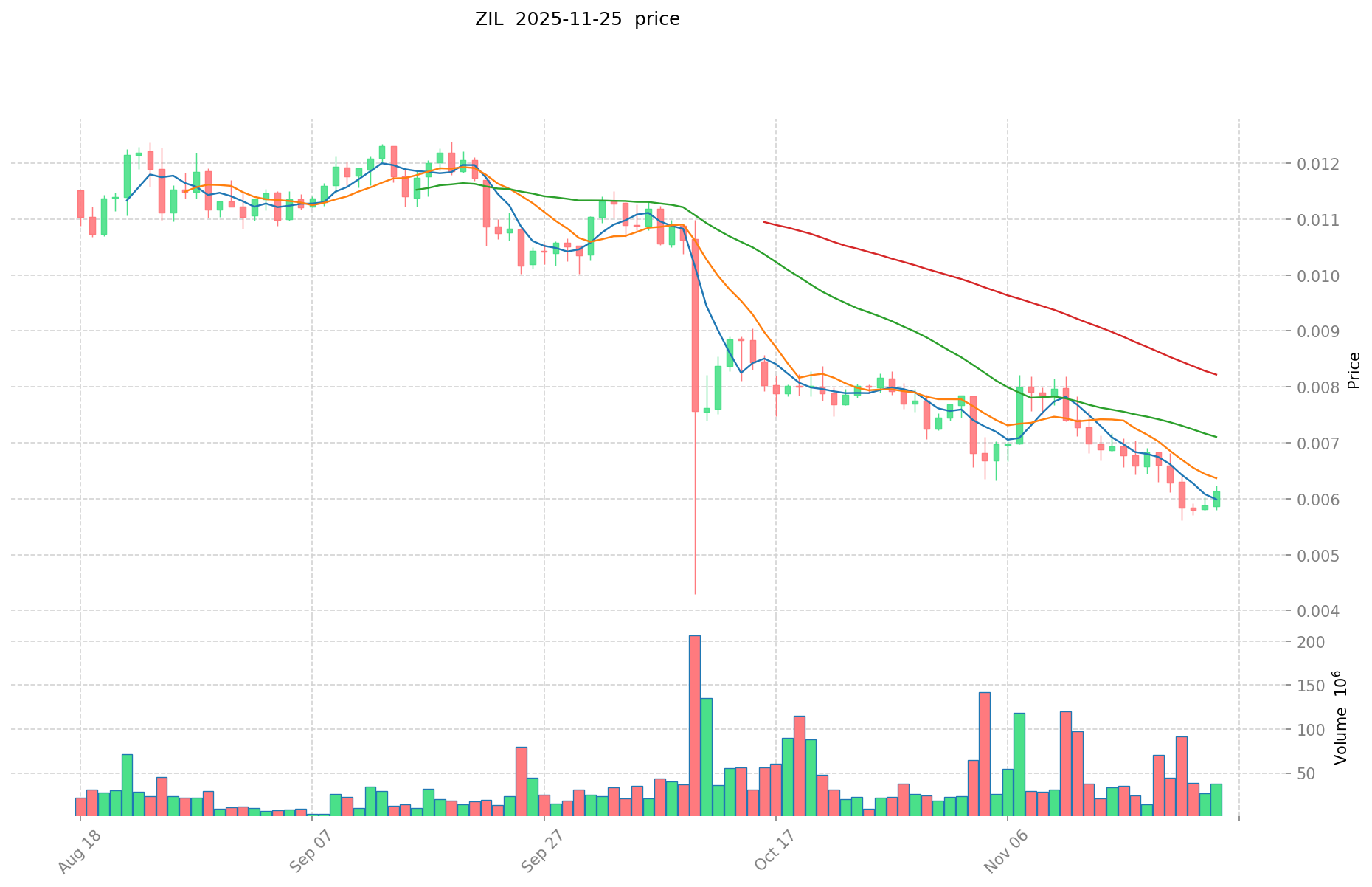PRISM vs ZIL: Comparing Two Innovative Approaches to Blockchain Scalability
Introduction: PRISM vs ZIL Investment Comparison
In the cryptocurrency market, the comparison between PRISM and ZIL has been an unavoidable topic for investors. The two not only show significant differences in market cap ranking, application scenarios, and price performance, but also represent different positioning in crypto assets.
PRISM (PRISM): Since its launch, it has gained market recognition for its comprehensive platform integrating multi-network scalability, financing initiatives, and gas-free token redistribution.
Zilliqa (ZIL): Launched in 2018, it has been hailed as a high-throughput public blockchain platform, aiming to solve the transaction speed and scalability issues of current blockchains.
This article will provide a comprehensive analysis of the investment value comparison between PRISM and ZIL, focusing on historical price trends, supply mechanisms, institutional adoption, technological ecosystems, and future predictions, attempting to answer the question investors are most concerned about:
"Which is the better buy right now?"
I. Price History Comparison and Current Market Status
PRISM and ZIL Historical Price Trends
- 2021: PRISM reached its all-time high of $0.04643859, followed by a significant price decline.
- 2021: ZIL experienced a notable price surge, reaching its all-time high of $0.255376.
- Comparative Analysis: During the recent market cycle, PRISM dropped from its peak to a low of $0.0000841, while ZIL declined from its high to a low of $0.00239616.
Current Market Situation (2025-11-25)
- PRISM current price: $0.0006742
- ZIL current price: $0.006048
- 24-hour trading volume: PRISM $2,628.53 vs ZIL $280,774.16
- Market Sentiment Index (Fear & Greed Index): 20 (Extreme Fear)
Click to view real-time prices:
- View PRISM current price Market Price
- View ZIL current price Market Price


II. Core Factors Affecting PRISM vs ZIL Investment Value
Supply Mechanisms Comparison (Tokenomics)
- PRISM: Fixed price 5-year all-inclusive plan with guaranteed no additional costs, ensuring business continuity and investment protection
- ZIL: Not specified in the provided information
Institutional Adoption and Market Applications
- Institutional Holdings: Information not available in the provided context
- Enterprise Adoption: PRISM offers reliability, security, and efficiency in energy-related services
- Regulatory Attitudes: No specific information provided about regulatory approaches to either asset
Technology Development and Ecosystem Building
- PRISM Technology: Provides 24/7 business continuity and protection services, emphasizing reliability and operational stability
- ZIL Technology: Not specified in the provided information
- Ecosystem Comparison: Information not available in the provided context
Macroeconomic Factors and Market Cycles
- Performance in Inflationary Environments: Information not available in the provided context
- Macroeconomic Monetary Policy: Information not available in the provided context
- Geopolitical Factors: Information not available in the provided context
III. 2025-2030 Price Prediction: PRISM vs ZIL
Short-term Prediction (2025)
- PRISM: Conservative $0.000653974 - $0.0006742 | Optimistic $0.0006742 - $0.00087646
- ZIL: Conservative $0.0035148 - $0.00606 | Optimistic $0.00606 - $0.0090294
Mid-term Prediction (2027)
- PRISM may enter a growth phase, with expected prices ranging from $0.00048147993 to $0.001187650494
- ZIL may enter a steady growth phase, with expected prices ranging from $0.006563889 to $0.00953951868
- Key drivers: Institutional capital inflow, ETF, ecosystem development
Long-term Prediction (2030)
- PRISM: Base scenario $0.000896032288007 - $0.001468905390176 | Optimistic scenario $0.001468905390176 - $0.001703930252604
- ZIL: Base scenario $0.007867040791142 - $0.012896788182201 | Optimistic scenario $0.012896788182201 - $0.018571374982369
Disclaimer: This analysis is based on historical data and market projections. Cryptocurrency markets are highly volatile and unpredictable. This information should not be considered as financial advice. Always conduct your own research before making investment decisions.
PRISM:
| 年份 | 预测最高价 | 预测平均价格 | 预测最低价 | 涨跌幅 |
|---|---|---|---|---|
| 2025 | 0.00087646 | 0.0006742 | 0.000653974 | 0 |
| 2026 | 0.0008296031 | 0.00077533 | 0.0007133036 | 15 |
| 2027 | 0.001187650494 | 0.00080246655 | 0.00048147993 | 19 |
| 2028 | 0.00141298310124 | 0.000995058522 | 0.00078609623238 | 47 |
| 2029 | 0.001733789968732 | 0.00120402081162 | 0.001071578522341 | 78 |
| 2030 | 0.001703930252604 | 0.001468905390176 | 0.000896032288007 | 117 |
ZIL:
| 年份 | 预测最高价 | 预测平均价格 | 预测最低价 | 涨跌幅 |
|---|---|---|---|---|
| 2025 | 0.0090294 | 0.00606 | 0.0035148 | 0 |
| 2026 | 0.009959004 | 0.0075447 | 0.006563889 | 24 |
| 2027 | 0.00953951868 | 0.008751852 | 0.006563889 | 44 |
| 2028 | 0.0126210457692 | 0.00914568534 | 0.0069507208584 | 50 |
| 2029 | 0.014910210809802 | 0.0108833655546 | 0.005768183743938 | 79 |
| 2030 | 0.018571374982369 | 0.012896788182201 | 0.007867040791142 | 112 |
IV. Investment Strategy Comparison: PRISM vs ZIL
Long-term vs Short-term Investment Strategies
- PRISM: Suitable for investors focused on energy-related services and business continuity solutions
- ZIL: Suitable for investors interested in high-throughput blockchain platforms
Risk Management and Asset Allocation
- Conservative investors: PRISM: 30% vs ZIL: 70%
- Aggressive investors: PRISM: 60% vs ZIL: 40%
- Hedging tools: Stablecoin allocation, options, cross-currency portfolios
V. Potential Risk Comparison
Market Risk
- PRISM: Volatility in energy services sector demand
- ZIL: Competition from other high-throughput blockchain platforms
Technical Risk
- PRISM: Scalability, network stability
- ZIL: Computing power concentration, security vulnerabilities
Regulatory Risk
- Different impacts of global regulatory policies on both assets
VI. Conclusion: Which Is the Better Buy?
📌 Investment Value Summary:
- PRISM advantages: Fixed price 5-year all-inclusive plan, focus on energy-related services
- ZIL advantages: High-throughput public blockchain platform, aimed at solving scalability issues
✅ Investment Advice:
- New investors: Consider a balanced approach with a slight bias towards ZIL due to its more established market presence
- Experienced investors: Evaluate both assets based on their specific use cases and potential in respective sectors
- Institutional investors: Consider PRISM for exposure to energy sector blockchain solutions, and ZIL for general blockchain infrastructure investment
⚠️ Risk Warning: The cryptocurrency market is highly volatile, and this article does not constitute investment advice. None
VII. FAQ
Q1: What are the main differences between PRISM and ZIL? A: PRISM focuses on energy-related services and business continuity solutions with a fixed price 5-year all-inclusive plan, while ZIL is a high-throughput public blockchain platform aimed at solving scalability issues in current blockchains.
Q2: How do the current prices of PRISM and ZIL compare? A: As of 2025-11-25, PRISM's current price is $0.0006742, while ZIL's current price is $0.006048.
Q3: What are the long-term price predictions for PRISM and ZIL? A: For 2030, PRISM's base scenario predicts a range of $0.000896032288007 - $0.001468905390176, while ZIL's base scenario predicts a range of $0.007867040791142 - $0.012896788182201.
Q4: How do the trading volumes of PRISM and ZIL compare? A: The 24-hour trading volume for PRISM is $2,628.53, while ZIL's is $280,774.16, indicating significantly higher liquidity for ZIL.
Q5: What are the potential risks associated with investing in PRISM and ZIL? A: PRISM faces risks related to volatility in energy services sector demand and potential technical issues like scalability. ZIL risks include competition from other high-throughput blockchain platforms and potential security vulnerabilities.
Q6: How should different types of investors approach PRISM and ZIL? A: New investors might consider a balanced approach with a slight bias towards ZIL. Experienced investors should evaluate both assets based on their specific use cases. Institutional investors could consider PRISM for exposure to energy sector blockchain solutions and ZIL for general blockchain infrastructure investment.
Share
Content